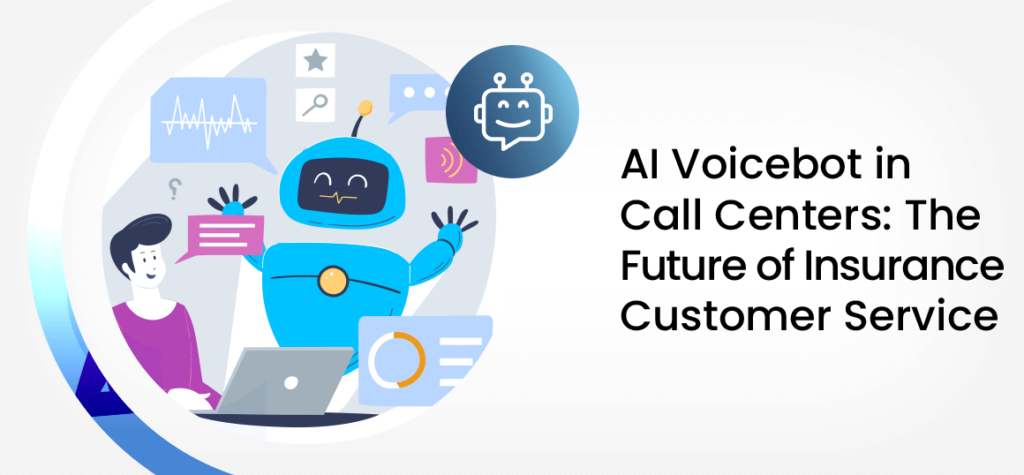AI Voicebot in Call Centers: The Future of Insurance Customer Service

The Client in the Era of Artificial Intelligence: AI Voicebots on the Insurance Hotline
The insurance industry is known for being governed by some of the most stringent regulations. It’s no surprise that for years it hesitated to implement systems like AI voicebots. However, today’s voice assistants are far more advanced than those that existed at the beginning and insurers have begun to recognize this. According to a MarketsandMarkets report, the AI market in insurance was valued at approximately USD 1.7 billion in 2020 and is projected to reach USD 4.5 billion by 2025, reflecting a compound annual growth rate (CAGR) of 21.5%.
Insurance Voicebot: Key to Process Automation
Voicebots enable the automation of many processes related to customer service. Traditionally, telephone support in insurance companies required significant human resources, resulting in high costs and long wait times. When a client calls the hotline and finally gets connected to a consultant, authentication is necessary. This process, typically involving providing an ID number, social security number or mother’s maiden name, does not require human intervention. Automating this repetitive process for each client individually brings significant savings and speeds up the operation of the hotline. It’s also worth noting that bots can answer frequently asked questions, a task most agents dislike.
Key Benefits of Automation with Voicebots
- Reduction in operational costs– eliminates the need to hire a large number of employees for phone support.
- Increased efficiency– faster processing of inquiries and client verification.
- Improved service quality– reduced wait times for connections and immediate authentication.
- Scalability– ability to handle more clients simultaneously without additional costs.
- Process Consistency– standardization of client verification, reducing the risk of errors.
Sentiment Analysis with AI in Insurance
Conversations with an insurance agent often occur in difficult situations, such as accidents. Clients may be under stress and emotional distress. In these cases, technology can significantly support the staff. AI voice assistants perform tasks beyond standard automation by analyzing sentiments, or words expressing emotions and monitoring voice tone, speech tempo and subtle voice changes. Based on this, they assess the speaker’s emotional state and choose the appropriate conversation scenario, such as repeating key instructions.
Personalized Policy Sales
The traditional role of the insurance agent is becoming obsolete. AI voicebots, thanks to advanced machine learning algorithms, can analyze client data and tailor communications and service proposals to their individual needs. For instance, when a client contacts regarding a life insurance policy, the voicebot can automatically suggest appropriate extensions or additional services based on the client’s history and risk profiles. It can also remind clients about policy expiration or guide them through the renewal process.
New Opportunities: Voicebots in Insurance Claim Processing
Processing an insurance claim often takes several days and involves multiple employees. This waiting period is stressful for clients and checking the status of a claim requires contacting the insurer. Intelligent voicebots significantly simplify this procedure for both parties. They can conduct a detailed interview with the insured about the damage, verify their data and prepare a comprehensive report for the decision-making agent. Additionally, they can automatically inform the insured about the progress of their claim, eliminating the need for employee involvement in this task.
Call Recording and Transcription: Key Support and Development Tools AI voicebots are invaluable tools in call recording and transcription. This technology is not only helpful in case of disputes but also a crucial element in employee development. It serves as documentation in case of complaints or discrepancies and as a resource for agents to review and supplement their notes from the conversation. Additionally, these recordings can be used in speech analytics for training and improving sales and customer service methods. As indicated by a Capgemini report, insurance companies using AI have seen a 20-30% increase in customer satisfaction due to more efficient service. This is mainly possible thanks to AI-based tools that analyze whether the conversation was conducted correctly, contributing to sales success or indicating what was missing to achieve it.
How Do Voicebots Integrate with CRM Systems?
Voicebots can also be integrated with customer relationship management (CRM) systems, allowing real-time updating and utilization of data. This integration enables more precise monitoring of interactions with insured clients and better management of the customer database.
EasyCall: Digital Transformation of Insurance with AI Voicebots
The future of insurance is inextricably linked to the development of AI technology. Companies that can integrate these innovations into their daily processes will not only gain a competitive edge but also build stronger, more enduring relationships with clients. In the era of digital transformation, AI voicebots are the key to the success and future of insurance. Now is the time for insurance companies to invest in these advanced technologies, creating a more efficient, customer-friendly and automated environment for both employees and clients. The future is now and AI voicebots are its most important tool.
Unlock new opportunities for your insurance company with advanced EasyCall voicebots. Our innovative technologies accelerate internal operations, reduce costs and increase customer satisfaction by offering personalized and empathetic service. EasyCall is the partner you can trust to lead your insurance company into a new era of operational excellence and advanced customer service. Join the forefront of the insurance industry, which is already reaping the unparalleled benefits of EasyCall voicebots.
